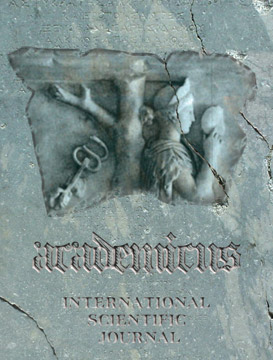Title:
Typology of think tanks: A comparative study in Finland and Scotland
Full Reference List:
| 1. | Abb, P. (2015) “China’s Foreign Policy Think Tanks: institutional evolution and changing roles”, Journal of Contemporary China, vol 24, No. 93, pp. 531-553. |
| 2. | Abelson, D. E. (2002), Do think tanks matter? Assessing the impact of public policy institutes. Montreal; Ithaca: McGill-Queen’s University Press. |
| 3. | Abelson, D.E. (2014), “Old world, new world: the evolution and influence of foreign affairs think-tanks”, International Affairs, Vol. 90, No. 1, pp. 125-142. |
| 4. | Almiron, N. (2017), “Favoring the elites: think tanks and discourse coalitions”, International journal of communication. Vol 2017, No. 11, pp. 4350-69. |
| 5. | Asher, T., & Guilhot, N. (2010), “The collapsing space between universities and think tanks”, Unesco (ed), 2010, pp. 341-343. |
| 6. | Boucher, S., Hobbs, B., Ebele, J., Laigle, C., Poletto, M., Cattaneo, D., & Wegrzin, R. (2004), “Europe and its think tanks; a promise to be fulfilled. An analysis of think tanks specialised in European policy issues in the enlarged European Union”. Studi |
| 7. | Coman, R. (2019), “Why and how do think tanks expand their networks in times of crisis? The case of Bruegel and the Centre for European Policy Studies”, Journal of European Public Policy, Vol. 26, No. 2, pp. 286-301. |
| 8. | Hames, T. and Feasey, R. (1994), “Anglo-American think tanks under Reagan and Thatcher”, A conservative revolution, pp. 215-237. |
| 9. | Huhtala, H., Syrjämäki, S. & Tuusvuori, J. S. (2016), Ajatuspajoista innovaatiokumppanuuksiin – Tapaus Filosofian Akatemia. Raportti uusimmasta valmennuskonsultoinnista ja julkisen järjenkäytön ohentuvasta kriittisyydestä. Eurooppalaisen filosofian seura |
| 10. | Invernizzi, E., & Romenti, S. (2011). Strategic Communication and DecisionMaking Processes Toward the Communication Oriented Organisation. Academicus International Scientific Journal, (3), 12. |
| 11. | Jezierska, K. (2018), “Performing Independence. The Apolitical Image of Polish Think Tanks”, Europe-Asia Studies, Vol. 70, No. 3, pp. 345-364. |
| 12. | Kervinen, E. (2006), Lessons from an experiment in think tanks. Experiment in think tank processes dealing with political issues, Ministry of Justice, Finland, Reports and accounts 2006:16. Helsinki. |
| 13. | Kuikka, J. (2018), “Ajatuspajat saavat valita puolensa”, Pohjalainen, pp. B12-13. |
| 14. | Medvetz, T. (2012), Think tanks in America, Chicago, IL: University of Chicago Press. |
| 15. | McGann, J. G. & Weaver, K. (2000), Think Tanks and Civil Societies, Catalysts for Ideas and Action, New Brunswick: Transaction Publishers. |
| 16. | McGann, J. G. (2016), The fifth estate: Think tanks, public policy, and governance, Washington, District of Columbia: Brookings Institution Press. |
| 17. | McGann, J. G. (2018), 2017 Global Go To Think Tank Index Report. University of Pennsylvania, Pennsylvania. |
| 18. | McLevey, J. (2014), “Think Tanks, Funding, and the Politics of Policy Knowledge in Canada”, Canadian Review of Sociology, Vol 51, No. 1, pp. 54–75. |
| 19. | Musaraj, A., & Gerxhi, J. (2010). Communication and Ethical Behavior in the Public Service. Academicus International Scientific Journal ISSN, 2079-3715. |
| 20. | Niemelä, S. & Wakeham, M. (2007), Kansalaisvaikuttamisen politiikkaohjelman loppuraportti. Oikeusministeriön toiminta ja hallinto. Helsinki. |
| 21. | Pautz, H. (2013), “The Think Tanks behind “Cameronism””, British Journal of Politics & International Relations, Vol 15, No. 3, pp. 362–377. |
| 22. | Plehwe, D. (2014), “Think tank networks and the knowledge–interest nexus: The case of climate change”, Critical Policy Studies, Vol. 8, No. 1, pp. 101-115. |
| 23. | Raivio, T., Sepponen, S., Pessala, P. Vaahtera, A. & Hjelt, M. (2018), Assessing the use of the proceeds from betting, pools and lottery activity budgeted for science. Publications of the Ministry of Education and Culture 2018:9. Lönnberg Print & Promo, H |
| 24. | Rich, A. (2005), Think tanks, public policy, and the politics of expertise. Cambridge University Press. |
| 25. | Ruser, A. (2018), “What to Think About Think Tanks: Towards a Conceptual Framework of Strategic Think Tank Behaviour”. International Journal of Politics, Culture & Society, Vol. 31, No. 2, pp. 179–192. |
| 26. | Scottish Policy Foundation. (2017), “Good Government: A Case for Funding Scottish Think Tanks”, available at: https://static1.squarespace. com/static/5925461b197aea3c30f9c2be/t/5981baa2d2b857fd3a69f6 3f/1501674149937/SPF_Pitch_A+Case+for+funding2+WEBSITE. |
| 27. | Shaw, S. E., Russell, J., Parsons, W., & Greenhalgh, T. (2015), “The view from nowhere? How think tanks work to shape health policy”, Critical Policy Studies, Vol. 9, No. 1, pp. 58-77. |
| 28. | Singh, R., Sharma, N. N., & Jha, U. (2014), “Think tanks, research influence and public policy in India”, Vision, Vol. 18, No. 4, pp. 289-297. |
| 29. | Stone, D. (2007), “Recycling bins, garbage cans or think tanks? Three myths regarding policy analysis institutes”, Public administration, Vol. 85, No. 2, pp. 259-278. |
| 30. | Thunert, M. W. (2006), “The development and significance of think tanks in Germany”. German Policy Studies, Vol. 3, No. 2, pp. 185-221. |
| 31. | Weaver, R. K. (1989), “The changing world of think tanks”, PS: Political Science & Politics, Vol. 22, No. 3, pp. 563-578. |
Back to article
Academicus
International Scientific Journal
pISSN 2079-3715
eISSN 2309-1088
Address:
Sheshi i Flamurit, Rruga Muze
Al-9401 Vlorë, Albania
Tel: +355 68 60 60 555
info@academicus.edu.al
https://academicus.edu.al


